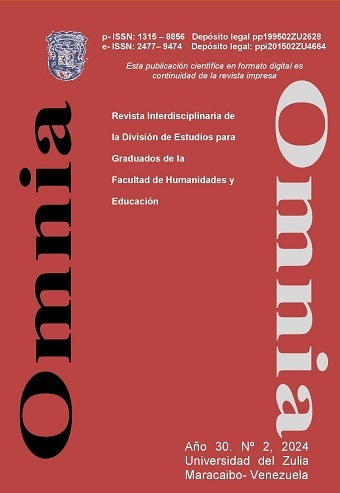Phenomenological-hermeneutical method. Epistemological-methodological course
Abstract
Addressing the phenomenological-hermeneutic method for its epistemological-methodological journey requires meticulous, conceptual and procedural work, an ideal path for the construction of scientific knowledge, focused on the lived experiences of the subjects, and located in the alternative of description, understanding and interpretation. The general purpose of this research was to analyze from a theoretical and epistemological perspective the phenomenological-hermeneutic method and the operations that are developed in its methodological journey. Theoretically it was based on the authors Dilthey (1966), Heidegger (2003), Husserl (1988), Gadamer (1988), Moustakas (1994). For the development, a documentary investigation was carried out, selecting printed and digital sources, scientific articles, and publications. The findings derived from the analysis indicate that phenomenology and hermeneutics from a single knowledge, for the development of qualitative works lies in the interaction, in the observation technique, generating presumptions, descriptions, understandings and interpretations of the context, this through the data provided by the subjects, actors, phenomenon of study
Downloads
References
Dilthey, Wilhelm (1947): Hegel y el Idealismo. Fondo de Cultura Eco-nómica. México.
______________ (1951). Hombre y Mundo en los siglos XVI y XVII. Fondo de Cultura Económica. México.
______________ (1966). Introducción a las Ciencias del Espíritu; ensayo de una fundamentación del estudio de la sociedad y de la historia. Revista de Occidente, Madrid.
Fuster Guillen, Doris (2019). Investigación cualitativa: Método feno-menológico hermenéutico. Revista Propósitos y Representaciones. Vol. 7, n° 1, pp. 201-229. Disponible en: http://dx.doi.org/10.20511/pyr2019. v7n1.267. Recuperado el 28 de enero de 2021.
Gadamer, Hans Georg (1988). Verdad y método, ed. Sígueme, Salaman-ca. Disponible https://www.academia.edu/9082328/Verdad_y_M%C3%-A9todo_I_Hans_Georg_Gadamer_
Heidegger, Martin (2003). Ser y Tiempo, Editorial Trota, Madrid.
Husserl, Edmund (1988). Las conferencias de Paris, México, Unam. (Pronunciadas en 1929 y publicadas por primera vez en alemán en 1950).
_____________ (1989). Aufsätze und Vorträge (1922-1937): Vol. Husserliana XXVII. Kluwer Academic Publishers.
________________ (1992). Ideas relativas a una fenomenología pura y una filosofía fenomenológica. Madrid: FCE.
Leal, Néstor (2013). El método fenomenológico: principios, momentos y reducciones. nesle@una.edu.ve. Universidad Nacional Abierta. Disponible en https://docplayer.es/31760458-
Moustakas, Clark (1994). Phenomenological Research Methods. United Status of América. Traducción con fines educativos de la Línea de Investigación: Teoría y Praxis de la Investigación Cualitativa ads-crita al Doctorado en Ciencias Humanas de la Universidad del Zu-lia. Maracaibo – Edo. Zulia – Venezuela.
Racamonde, Minerlines (2010). Fenomenología autopoietica desde una taxonomía en el hacer-ser investigación educativa. Congreso Iberoamericano de Educación. Universidad de Carabobo, Vene-zuela.
Sandoval, Casimilias (1996). Investigación Cualitativa. Bogotá: ICFES.





